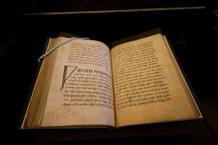How did elegy drop the romance and move towards our own understanding as a mourning song? Part of the answer is hinted by Mimnermus’ elegy: ‘And when dolorous Age cometh, that maketh a man both foul without and evil within…’. This doleful if unflinching snapshot of the human condition (we are born, we love, we age, we die) indicates elegy’s next direction.
This incarnation has been called The Universal Elegy (or ‘Lacrimae Rerum’). It is exemplified by the Old English elegies collected in the Exeter Book during the late 10th century. Critic JC Bailey hears in them: ‘the cry of the broken heart, the musing of the solitary wanderer, the utterance now of quiet melancholy, now of passionate grief. It comes from the heart and goes to the heart.’
